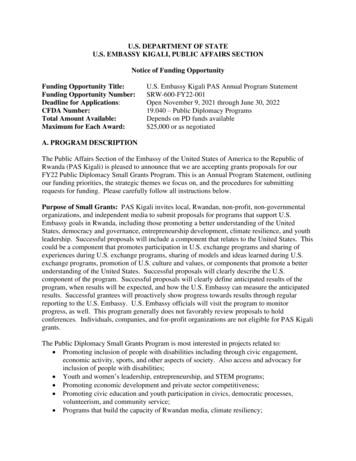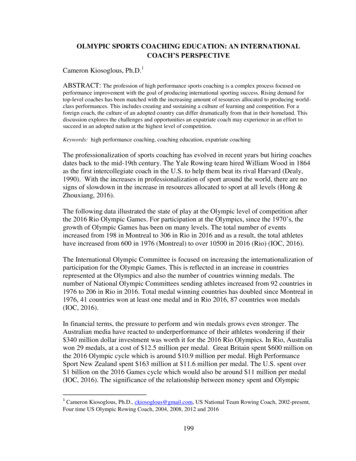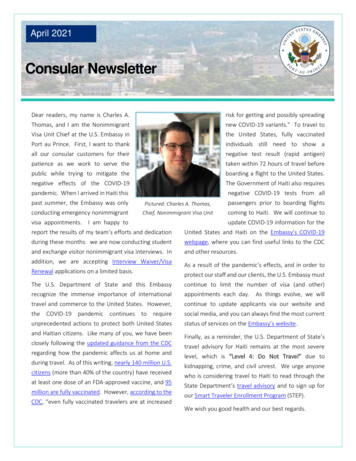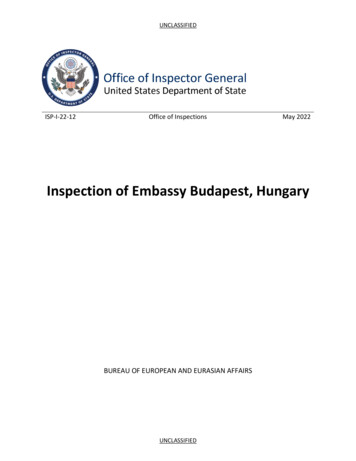
Transcription
ProsperousStrengthening theeconomy so that allUgandans can prosperrequires increasedproductivity andsustainable growth.12Fiscal Year 2017 Report to the Ugandan People
The United States supports several initiatives that increase Uganda’s prosperity. Withagriculture making up a significant portion of Uganda’s economy, the U.S. governmentis linking Ugandans with U.S. agricultural investors and innovators. We are also helpingUganda improve food security, which provides Ugandans with sustenance and salesopportunities. Additionally, we help connect U.S. and Ugandan companies, enablingup-and-coming Ugandan firms to access quality U.S.-made equipment that will helpthem develop Uganda’s economy. Our commercial services, trade missions, trainingprograms, entrepreneurial support, and microfinance projects provide Ugandans withvaluable business skills and open the doors to new partnerships and markets. By preservingwildlife and promoting tourism, our conservation efforts contribute to Uganda’s economicgrowth and resilience. Together, our trade promotion and development initiatives increaseASSISTANCEFOCUS AREASeconomic opportunities and reduce ronment and Biodiversity 392,288,452worth of coffee, maize, andbeans was sold by farmerssupported by U.S. programsU.S. governmentassistance to promotea prosperous Uganda:Fashion designers and models at the SkilledExpressive Entrepreneurial (SEED) fashion show,which promotes entrepreneurship among youthin the Ugandan fashion industry. 60.1millionUGX 215.7 billionFiscal Year 2017 Report to the Ugandan People13
ProsperousAgricultureU.S. initiatives to increase agriculturalproductivity are strengthening Uganda’seconomy, helping more farmers andtheir families prosper, and improvingfood security throughout the country.Agriculture is the backbone of Uganda’s economy, employing nearly two-thirds of Uganda’s laborforce and accounting for 85 percent of the country’s export earnings. Sustaining improvements inagriculture and addressing key challenges – such as inefficient farming techniques, high businesscosts, and limited distribution networks – is therefore essential to inclusive growth in Uganda.The United States is committed to helping more Ugandan farmers and agricultural companiesaccess the resources and infrastructure they need to be productive and competitive, and ensuregreater food security for all Ugandans. Through USAID’s Feed the Future initiative, we helpexpand production and improve storage, increase the quality of agricultural inputs and decreasecounterfeits, build national and international trade networks for Ugandan agricultural products,and help farmers establish sustainable commercial operations linking to U.S. markets.SPOT L I G H T PR O G RA MCommodity Productionand MarketingA part of the Feed the Future initiative,the Commodity Production and Marketing(CPM) program focuses on increasing theproduction of quality coffee, maize, andbeans by smallholder farmers. Thesethree crops have the greatest marketingpotential and the ability to improve thecountry’s food security.Thanks to CPM, 434,979 farmers in 34 Feedthe Future districts have benefitted fromimproved crop productivity and access tobetter markets. Between 2014 and 2017,incremental sales rose from 7,547,941 to 392,288,452, resulting in increased farmerincome and improved food security.Bean farmers supported byFeed the Future sorting their crops.14Fiscal Year 2017 Report to the Ugandan People
SUCCESS STORYMark FatOdong,founder ofAgriQuerySolutions,at workin NwoyaDistrict.Empowering Youth Through Agricultural SkillsYouth Leadership for Agriculture (YLA), a project supported through Feed theFuture, is working to expand economic opportunities for Ugandan femaleand male youth, ages 10 to 35, in agriculture-related fields. The goal is toincrease their incomes and build entrepreneurship, leadership, and workforcereadiness. YLA also strengthens the capacity of commercial operations toensure sustainability of innovative youth engagement approaches.“I wanted to inspire others and train and create jobs in my community,” saysMark Fat Odong, founder of AgriQuery Solutions, a consultancy business thatadvises young farmers. “I want people to be as passionate about farming as Iam and realize that they can make a good living from it. The YLA program hashelped me to scale up and reach more youth farmers. So far, we have trainedabout 200 youth in optimal cabbage and tomato growing. We encourage ourfarmers to be role models, so soon this will multiply 200-fold.”Thanks to funding from the U.S. government, YLA has leveraged 11.8 millionin Ugandan private sector investments to improve business practices of youthentrepreneurs and provide full time jobs to over 7,000 youth.Fiscal Year 2017 Report to the Ugandan People15
ProsperousTradeEliminating barriers to trade andincreasing market access enables Ugandanproducers to compete globally and helpsmodernize the national economy.To be competitive in the region and beyond, Ugandan producers and manufacturers need toproduce high-quality products and bring them to market efficiently. U.S. assistance is helpingUganda to develop trade-friendly policies and enabling producers to ensure consistentproduct quality.The Enabling Environment for Agriculture (EEA) program, for example, has helped theGovernment of Uganda to develop seed and plant regulations that align with regulations for seedtrade in Common Market for Eastern and Southern Africa (COMESA). This facilitates improvedaccess to COMESA for Ugandan seed producers. EEA has also enabled local governmentsin Mubende and Kiboga Districts to formulate and implement maize quality ordinances thatconform to the East African Community grain standards. As a result, farmers, agro-traders, andagribusinesses are producing quality Ugandan seed that benefits from improved competitivestanding in international trade.A worker storingpackaged driedfruit. Dried fruitis a profitableproduct thatis compliantwith the AfricanGrowth andOpportunityAct (AGOA),which enablesproducers toexport theirproducts andaccess U.S.markets moreeasily.16Fiscal Year 2017 Report to the Ugandan People
SUCCESS STORYIncreasing Trade and Investment BetweenUganda and the United StatesOur trade missions link U.S. and Ugandan businesses, buildingand strengthening the ties that help Uganda’s economy expand.Last year, U.S. Mission Uganda held a three-day Agriculture TradeMission in Kampala to increase two-way trade and investmentbetween the United States and Uganda.AmbassadorMalacspeaks atthe 2017AgricultureTradeMission inKampala.As a result of the trade mission, U.S. firm Ag Vision is partneringwith several U.S. firms to start distributing high-quality U.S.manufactured goods to Ugandan farmers. Additionally, theNebraska Department of Agriculture is working with Uganda’sMakerere University to develop a training and exchange programto enhance the technical skillset of graduating Ugandan universitystudents. Finally, New York-based bio-stimulant producer AgBiotech will develop a pricing strategy for distributors to sell theirproducts to Ugandan commercial farmers.Fiscal Year 2017 Report to the Ugandan People17
ProsperousEntrepreneurshipEnabling more Ugandans to establishand sustain their own businessesexpands economic opportunities.Uganda is one of the most entrepreneurial countries in the world. However, the country’sstartup ecosystem is still young and lacks the support that entrepreneurs need to succeed.The U.S. Department of State’s Global Innovation through Science and Technology (GIST)initiative is providing funding for Innovation Village Kampala to host monthly meet-ups tosupport the entrepreneurship ecosystem in Kampala. Innovation Village is building a network ofentrepreneurs and creating programs and opportunities that help young entrepreneurs overcomechallenges together.We also sponsor initiatives that help Ugandan entrepreneurs and producers access financialand information resources that enable them to secure credit and build the business skills theyneed to compete and prosper. U.S. support helps farmers transform subsistence production intocommercial operations, small business owners sustain and scale their enterprises, and youngpeople take advantage of opportunities to participate in the growing economy.SPOT L I G H T PR O G RA MStartUp UgandaStartUp Uganda – an initiative of the Peace Corps andYouthAlive, a youth-focused Ugandan NGO – targetsunemployed or underemployed youth to help thecountry’s next generation of entrepreneurs developbusiness skills. Youth are matched with accomplishedmentors who coach them to strengthen theirbusiness plans and accomplish their goals.Last year, Start Up Uganda hosted four regionalcamps for more than 120 youth in the districts ofMbale, Bushenyi, Masaka, and Kitgum. Each youthidentified a mentor from their district to work with,who then attended a Mentorship Training led byYouth Alive regional coordinators along with thePeace Corps. While at camp, youth prepared andpitched business plans to camp staff and theircolleagues. The experience culminated in a regionalconference where youth and mentors learn moreabout local resources, public and private businesses,educational opportunities, and communityentrepreneurs.StartUp Uganda participants in Kitgum District.18Fiscal Year 2017 Report to the Ugandan People
EnergyTechniciansinstall newelectricalequipmentin a ruraldistrict, anachievementmadepossibleby thesustainableexpansionof Uganda’spowersystem.Uganda is increasing its energy generationcapacity in responsible and sustainable waysto meet the demand of its growing population.To build Uganda’s generation capacity, USAID’sPower Africa initiative is working to increaseLast year Power Africaaccess to both on-grid and off-grid electricityenabled 423,486 newthroughout the country. Over the past year,clean energy connections,Power Africa advanced master plans for threerural electricity service territories, which resultedinclusive of solar lanterns,in the identification of over 130,000 possiblesolar home systems,new connections and 100 mini-grid sites. Powerand on-grid electricityAfrica also supported the development of aconnections.Ugandan connections policy, which will lead to1.4 million additional connections to the nationalgrid by 2020 and leverage 60 million from otherdevelopment partners. As part of these efforts,Power Africa is taking important steps to create awelcoming environment for private sector participation and investment.Last year, USAID also launched a three-year 11 million initiative that will support additionalincreases in generation capacity and access to electricity, and help cultivate a policy environmentin the energy sector that facilitates these goals.Fiscal Year 2017 Report to the Ugandan People19
ProsperousEnvironment and BiodiversityUganda’s rich biodiversity is a nationaltreasure and an importantresource for the Ugandan people.111,000For Uganda, conservation efforts are also economic developmentefforts that help the country to prosper. Many of the benefits thatcome from Uganda’s biodiversity – food security, raw materials,pollination, and watershed protection – contribute to Uganda’seconomic growth and resilience, particularly for Ugandans who livein rural areas. Revenue from tourism – more than 1.3 billion in 2016,roughly 80 percent of which was generated from visits to nationalparks – is an important contributor to Uganda’s economy.hectaresU.S. assistance helps Uganda manage its ecosystems responsiblythrough programs that help preserve wildlife and wildlands, promoteconservation, mitigate the impacts of oil and gas exploration, combatwildlife crime, and educate the public on issues like climate change.assistance.of criticalconservationlands benefittedfrom improvedmanagementthanks to U.S.A Uganda kobcalf grazes inMurchisonFalls NationalPark.A wildlifescout speakswith parkrangersat KidepoNational Park.20Fiscal Year 2017 Report to the Ugandan People
Our assistance supports efforts to ensure that Ugandan’s biodiversity and environmentreceive the protection they deserve while also enabling responsible use. Last year, theUnited States supported sustainable natural resource management through chili productionand beekeeping enterprises implemented by communities near target conservation areas.Beekeepers near Budongo Central Forest Reserve, for example, formed the KICODACooperative and are now packaging and marketing all their products – which include honey,propolis, beeswax, and wine – thereby expanding their economic opportunities.Continued support from the United States for community and private conservancies nearMurchison Falls and Lake Mburo National Parks has provided important safeguards forsecuring wildlife outside protected areas and reducing human-wildlife conflict. Last year,the constitution for the Murchison-Aswa Falls Conservancy was developed and approved,protecting 11,000 hectares held by more than 58 landowners.U.S.assistanceis helpingpreserveUganda’swildlandsand enablingUgandanfarmers toadapt to achangingclimate.S POTL I G H T PROG RA MAdapting to Climate ChangeU.S. assistance supports Uganda’s efforts to address weather-related impacts onagriculture through access to reliable climate and weather data, development ofeffective policy responses, and research and education. Our support increasedthe capacity of the Ugandan government and NGOs to interpret and usemeteorological data to strengthen adaptation and enhance agricultural productionin 19 districts.Additionally, last year USAID’s Education and Research to Improve Climate ChangeAdaption program and the Makerere University Centre for Climate ChangeResearch and Innovation co-hosted the 11th International Community-BasedAdaptation Conference.Fiscal Year 2017 Report to the Ugandan People21
Prosperous StartUp Uganda StartUp Uganda - an initiative of the Peace Corps and YouthAlive, a youth-focused Ugandan NGO - targets unemployed or underemployed youth to help the country's next generation of entrepreneurs develop business skills. Youth are matched with accomplished mentors who coach them to strengthen their










